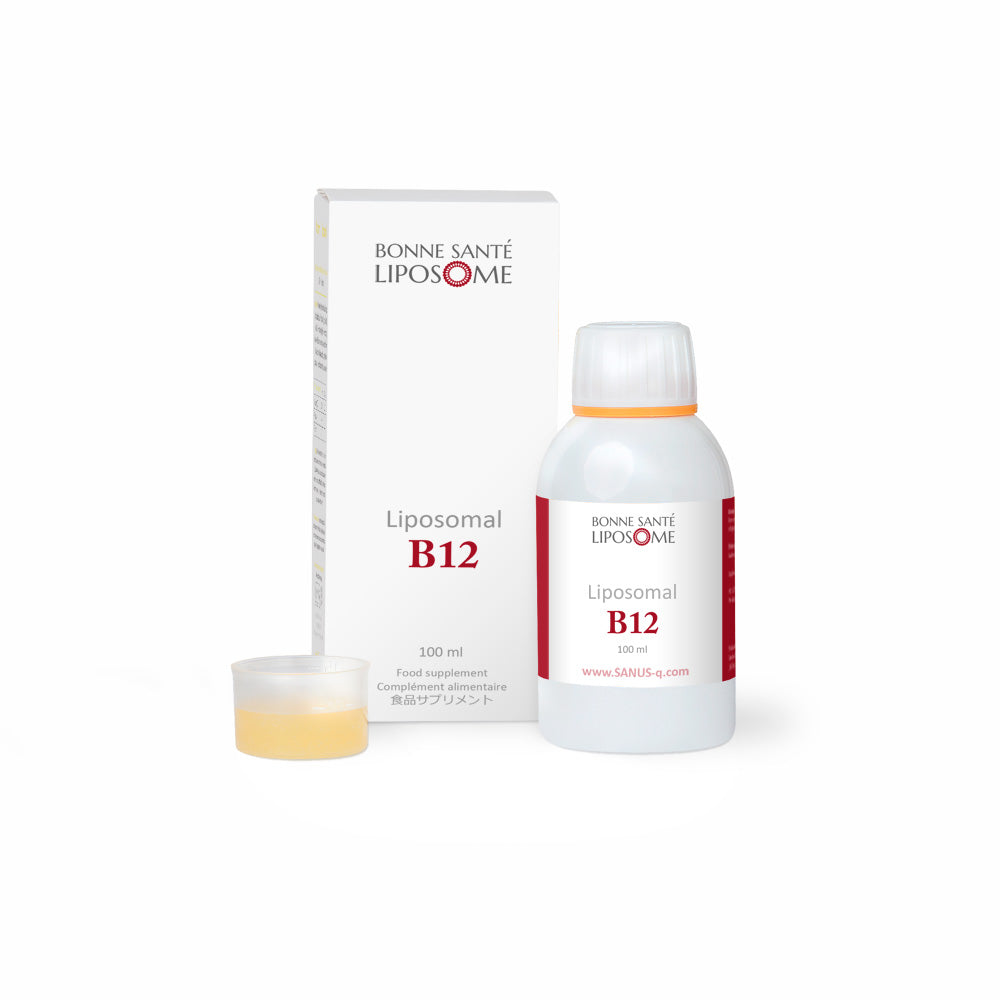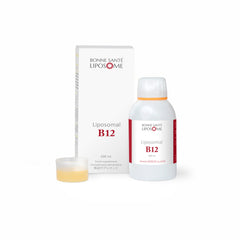Bonne Santé Liposome: Vitamin B12 - 100ml
Liposomal B12 for a well-functioning nervous system and improved energy levels
Current batch best before date: Product discontinued
(Check our current promotions before buying)
Contains: (per 3 ml) 3 mg Vitamin B12 (as Hydroxocobalamin)
Suggested dosage: 1 x 3 ml directly in mouth or glass of water or juice, unless otherwise advised by a healthcare professional. Do not exceed recommended dosage.
Ingredients: Vitamin B12 (as Hydroxocobalamin); lecithin (Non-GMO SOY) - emulsifier; glycerol - humectant; xylitol - sweetener; natural vitamin E (as d-alpha tocopherol) - antioxidant; vanilla and apricot aroma – flavour; potassium sorbate - preservative; purified water
Recommended serving size: 3 ml
Servings per bottle: 33
Storage: Store cool and dry. When opened store in refrigerator and finish within 2 months.
Product description PDF: View Here
------------------------------
Product Description
- 100 ml Vitamin B12 (as Hydroxocobalamin)
- Use of liposomal technology for better absorption and bio-availability
- Available in vanilla and apricot flavour
- Non-GMO product
- Measuring cup included
- Resealable screw top lid
B12 Health Benefits
- Boosts energy levels and reduces fatigue
- Helps in the formation of healthy red blood cells
- Supports heart health
- Supports nervous system and brain health
- Involved in the production of DNA, proteins and hormones
Why do you need Vitamin B12?
Vitamin B12 is one of the vitamins in the B family. Your body can’t make B12 on its own and you must get it either from foods or supplements. Animal based products like fish, eggs, beef and dairy are a good source of B12. It is also found in nutritional yeast and fortified cereals.
Vitamin B12 plays an important role in a range of functions. You need this vitamin to make healthy, fully matured red blood cells. It also helps in energy production. What’s more, DNA synthesis requires B12 as an essential co-factor. With such diverse roles to play across the body, it is obvious that vitamin B12 deficiency will result in a wide array of symptoms.
1. Energy production
Vitamin B12 is involved in energy metabolism.
- Helps the formation of the hemoglobin, a key protein in your red blood cells that carries oxygen to all your tissues and organs.
- Required for reactions that are involved in producing energy from fats and proteins that you eat.
Low B12 levels affect your energy levels and are likely to trigger symptoms of excessive fatigue, shortness of breath, general weakness, headaches and persistent lack of energy.
2. Formation of DNA and red blood cells
- B12 and folic acid play an important role in DNA synthesis
- DNA is required for the production of new, healthy red blood cells
Insufficient amounts of B12 and folic acid impairs DNA synthesis and causes the bone marrow to produce immature and abnormally large red blood cells. This condition is known as megaloblastic anemia. The symptoms of B12 deficiency anemia include light-headedness, muscle weakness, pale skin, diarrhea, loss of appetite and weight loss, red and swollen tongue, and tingling in the hands and feet.
3. Healthy heart function
- Vitamin B12, along with B9 and B6, converts homocysteine into methionine
- Methionine, in turn, is a critical ingredient for methylation reactions, which are involved in the production of DNA, RNA, hormones, myelin and proteins.
Lack of Vitamin B12, B6 and B9 leads to increased build-up of homocysteine – an amino acid naturally produced during protein metabolism. High levels are considered as a reliable marker of heart disease. Homocysteine build-up has been associated with inflammation in the arteries, atherosclerosis and formation of blood clots.
4. Healthy brain and nervous system
- Helps with the formation of healthy myelin sheath, a fatty substance that covers the nerves and protects the nerve fibres from damage
- Helps in myelin regeneration
- Involved in the production of neurotransmitters like dopamine, serotonin and melatonin, that regulate mood, memory and sleep.
- Gets rid of excess homocysteine, an amino acid associated with cognitive decline and brain shrinkage
Initially, a moderate B12 deficiency can cause tingling in the hands or feet. Overtime, additional symptoms, such as balance issues, memory loss, brain fog and blurred vision (in rare cases) when the optic nerve is affected, may develop. A long-term untreated deficiency can lead to irreversible nerve damage. Studies show that vitamin B12 supplements can improve cognitive performance and lower brain shrinkage. [1] [2]
Do you have vitamin B12 deficiency?
The deficiency of B12 typically increases with age. Pregnant and breastfeeding women also need more vitamin B12. In addition, many health conditions and lifestyle factors may also put you at an increased risk for low B12 levels.
- A strictly vegetarian diet
- Inability to absorb B12, for example if you have Celiac disease, Crohn’s disease, inflammatory bowel disease (IBS), pernicious anemia, diabetes, intestinal surgery and weight loss surgery
- Prolonged use of antibiotics, antacids, H2 blockers, proton pump inhibitors and Metformin (for diabetes)
- Excessive drinking and smoking
Bonne Sante Liposome Vitamin B12
- Improved bio-availability and absorption of the nutrient by using liposomal technology
- Contains phospholipids derived from non-GMO soy lecithin
Consider consulting your doctor before taking any supplement.
References:
- Grober at al. Neuroenhancement with Vitamin B12—Underestimated Neurological Significance. Nutrients. 2013.
- Gwenaëlle Douauda et al. Preventing Alzheimer’s disease-related gray matter atrophy by B-vitamin treatment. PNAS. 2013




 Pin it
Pin it